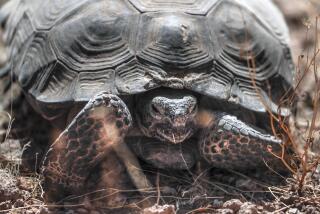Unlikely Crew Dots Desert’s ‘Tough’ Miles
NAVAJO, Arizona — Against a backdrop of parched range lands and mesas tinged with brilliant hues of red and orange, an unlikely gathering of American Express employees and Navajo Indians clasped hands beneath the sun.
Hands Across America officials had billed the lonely, mirror-flat stretch of Interstate 40 running through this tiny burg about 70 miles west of Gallup, N.M., as among the “toughest miles” in the nation to fill.
They were probably right. On either side of the 1 1/2-mile-long chain of more than 1,000 corporate employees and more than 100 Indians that turned out Sunday was an unbroken vista of sage and sky.
A few dared to take a stand alone, far from the huge, blue hot air balloons that marked the mile claimed by American Express.
One of these forlorn specks in the desert was Eleanor Brown, 19, a Navajo from Ganado, Ariz. Her only companion was a transistor radio.
“I’m just here under the sun waving at everyone driving by,” said Brown, sitting beside a sign that read: “Lend a hand!”
But the American Express brigade of 1,320 employees and their families bused here from Salt Lake City and Phoenix on Saturday will not soon be forgotten.
Truly, they did not leave home without it.
As locals watched in amazement, the city slickers erected a self-contained tent city with the efficiency and speed of a traveling circus while Merl Haggard’s “Big City Turn Me Loose and Set Me Free” blared from a sound system.
Saturday night, the group ate a barbecue dinner, listened to live rock music and danced beneath a huge white tent as dozens of security guards kept outsiders away.
The shindig cost American Express about $150,000--about $33,000 of which went to Hands Across America--said Jerry C. Welsh, executive vice president, worldwide marketing. Arizona Gov. Bruce Babbitt stood in the line with the corporate contingent.
Susanne Cordell, 39, of Phoenix, and her daughter, Rebeccah Griggs, 9, were among the comfortable campers.
“Tomorrow, we will hold hands around the world and everybody that cares about the homeless and hungry will join in,” Rebeccah said.
“I care, my mom cares and all these people care,” she said waving a hand across the 10-acre campsite that had been cleared of natural sage and salt bush by bulldozers days before.
“So much for erosion control,” said a ranger from nearby Petrified Forest National Park.
A powwow sponsored by Native Hands Across America and designed to bring 100,000 Indians from across the nation to the region, was also something of a disappointment.
“Reservation Indian people do not generally embrace some of the craziness Anglos indulge in,” said Ron Faich, demographer for the Navajo Nation.
But for weeks in advance, powwow organizers tried to lure Native American performers here with offers of $80,000 in prize money to be awarded during traditional dance contests at Red Rock State Park, about 10 miles west of Gallup.
But on Saturday night, embarrassed Indian leaders announced to a mere 800 spectators that all but $10,000 of the prize money never materialized.
The reasons for the lack of money were unclear. But Jerry Brown, general manager of Native Hands Across America, blamed the national Hands Across America organization for failing to come through on earlier promises of financial support, among other things.
Hands Across America leaders denied that they had promised money and said a formal alliance with the Indians never existed.
“Now I know how my grandfathers felt,” said Brown.
If the money was gone, spirits were high. Local bankers stepped up to make donations for the cause as others passed hats that returned brimming with cash.
Indians elsewhere were also an inspiration to all who ventured out to the “toughest miles” on Sunday.
Marie Friday, 63, of Ganado, and her grandchildren waited anxiously at Chambers, Ariz., about six miles east of Navajo for the appointed hour.
“It is a good cause because it is for the homeless and hungry and there are many on the reservation like that,” said Friday, wearing the “blessed turquoise jewelry” she only takes out for special occasions.
“It is good that the white man has come to this part of the country,” Friday added, an hour before the linking of hands. “They will better understand our culture and values.”
At her side, Friday’s granddaughter, Misty Dawn Friday, 4, cuddled an as yet unnamed puppy she received Sunday morning as a gift.
“She may call it America,” said the girl’s mother, Marlene Friday.
More to Read
Sign up for The Wild
We’ll help you find the best places to hike, bike and run, as well as the perfect silent spots for meditation and yoga.
You may occasionally receive promotional content from the Los Angeles Times.







